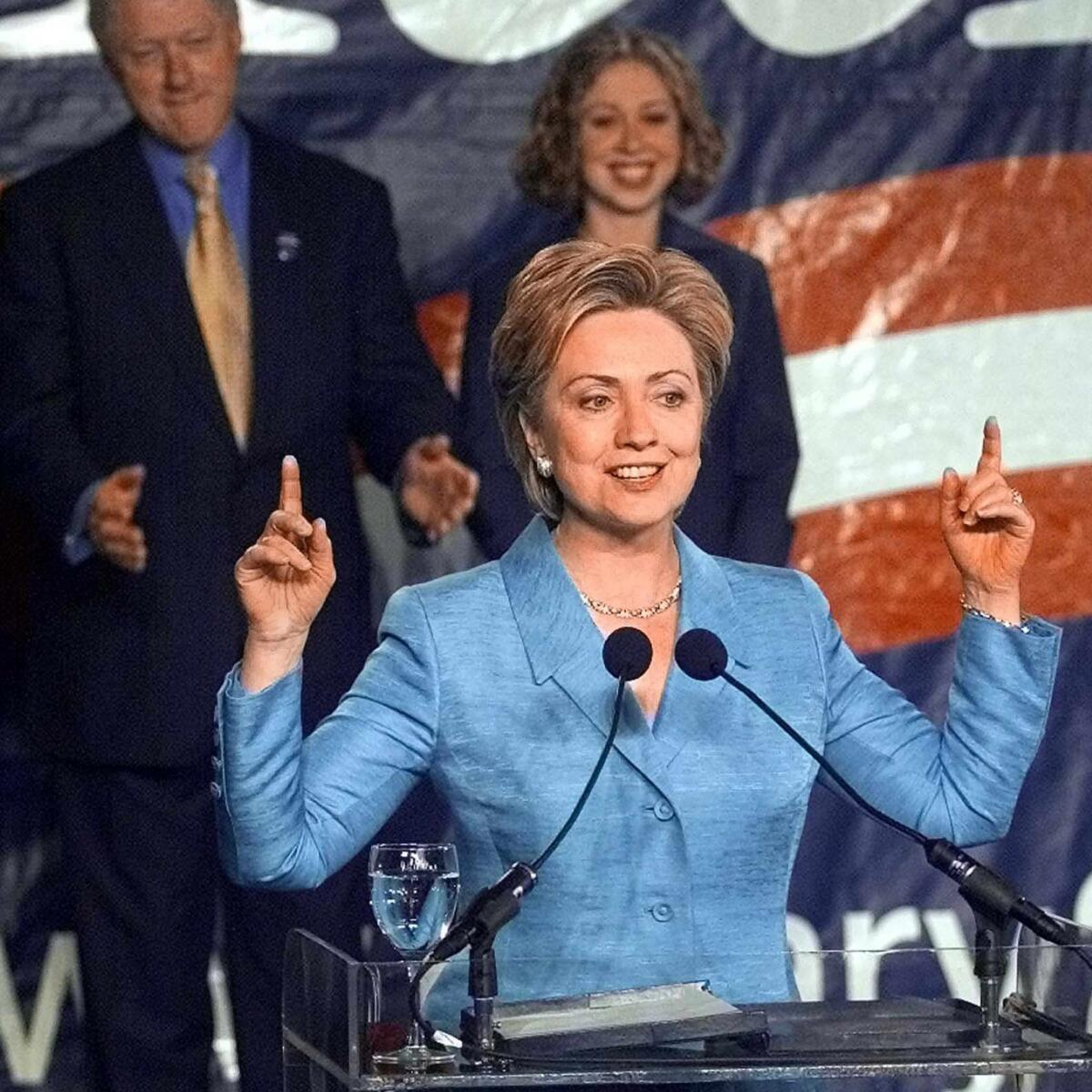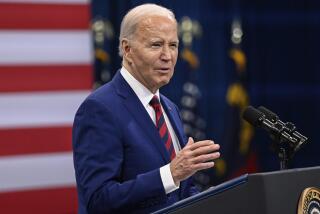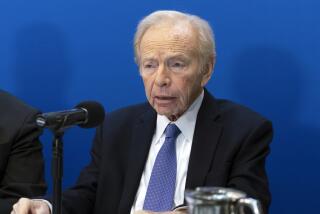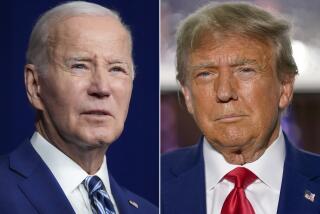From the Archives: Historic First for a First Lady as Clinton Wins N.Y. Senate Race

In a history-making win, Hillary Rodham Clinton captured New York’s hotly contested Senate seat Tuesday, marking the first time a first lady has sought and won elective office.
Clinton’s victory over Republican Rep. Rick Lazio of Long Island all but guarantees that she will become an influential figure in the national Democratic Party--as well as a lightning rod for GOP opposition to her liberal policies and her husband’s presidential legacy.
With most of the vote counted, Clinton led Lazio comfortably, 56% to 43%. Exit polling of voters showed she beat him handily in New York City, ran respectably in traditionally Republican upstate New York and won over many white female voters who had for months been ambivalent about supporting her campaign.
Flanked by President Clinton--who wiped tears from his eyes--as well as their daughter, Chelsea, the first lady claimed victory about 8 p.m. PST. “I just want to say from the bottom of my heart, thank you, New York,” she said. “Thank you for opening up your minds and your hearts--for seeing the possibility of what we could do together for our children and our future here in this state.”
After her remarks, the president told reporters: “I’m just elated. I’m so proud of her. I’m so happy and so grateful. I don’t know what else to say.”
Lazio had conceded the race minutes before Mrs. Clinton spoke. Referring to October’s World Series between New York’s two baseball teams, he said: “I feel like the Mets. We came in second.”
With her victory, Clinton has “dramatically redefined the role of first lady and opened a path for women after her,” said Geraldine A. Ferraro, who as the Democratic vice presidential nominee in 1984 became the first--and so far only--female candidate on a major party’s presidential ticket. “It’s a clear message that women are entitled to the same kind of independence as a man in choosing to run for office, no matter what our spouse does or has done professionally.”
Hillary Clinton has served as a key political advisor to her husband since they married in 1975. During Bill Clinton’s first term as president, she took an unusually high-profile role in leading a sweeping proposal to reform the nation’s health care system.
But that effort died in Congress and Mrs. Clinton became viewed by many other Democrats as a political liability to the president. She kept a relatively low profile during his second term, especially as he endured the Senate impeachment trial stemming from his affair with White House intern Monica S. Lewinsky.
For some observers, Clinton’s winning bid to fill the seat of retiring Democratic Sen. Daniel Patrick Moynihan represents a political rebirth for her and a move out of her husband’s shadow.
“She is the first first lady who attempted to realize ambitions through the political process,” said Ellen Fitzpatrick, professor of political history at the University of New Hampshire. “The role of first lady has now been broadened.”
As excitement built through the evening at Clinton’s headquarters, she and her husband met with aides to evaluate early returns in a suite above the ballroom of the Grand Hyatt Hotel in Manhattan. The candidate “was so excited, we all cheered when it became clear she was going to win, and she hugged everybody,” said press secretary Karen Finney.
Clinton’s victory didn’t come easy, given that she was a polarizing figure from the moment she began her campaign in August 1999. After an early lead in the polls, she trailed New York’s Republican Mayor Rudolph W. Giuliani, who was expected to be the GOP candidate. Polls found that nearly 40% of voters had a negative opinion of her, a figure that held for 16 months.
Giuliani spent more than $19 million on the preliminary stages of his campaign and launched stinging attacks on Clinton as a carpetbagger out of touch with New York. But he quit the race last May, amid revelations that he had prostate cancer and reports that his marriage was dissolving.
Enter Lazio, a moderate, four-term congressman who had long been the favored candidate of New York Gov. George Pataki and other state Republican heavyweights. Lazio, 42, had less than six months to put together his campaign, and, although he raised more than $30 million, he was plagued by missteps.
During his first debate with Clinton, for example, he crossed over to her podium and thrust a typewritten agreement to ban campaign “soft money” contributions under her nose. The incident struck many viewers as juvenile and bullying.
Just as important, Lazio failed to define himself with voters. By contrast, Clinton campaigned tenaciously throughout the state, making surprising inroads with voters in the upstate communities.
The campaign turned nasty in the final month, with both candidates courting the state’s Jewish vote, estimated to represent at least 12% of the total turnout. Lazio attacked Clinton over reports she got contributions from a Muslim group whose members supported Middle East terrorism. Clinton responded with ads challenging his fundamental decency and ethics.
“Hillary campaigned harder and much more effectively than he did,” said Ferraro. “Now she’s got a chance to make some history of her own.”
Times staff writers Geraldine Baum and John J. Goldman contributed to this story. This article was published in The Times on Nov. 8, 2000.
More to Read
Get the L.A. Times Politics newsletter
Deeply reported insights into legislation, politics and policy from Sacramento, Washington and beyond. In your inbox three times per week.
You may occasionally receive promotional content from the Los Angeles Times.






